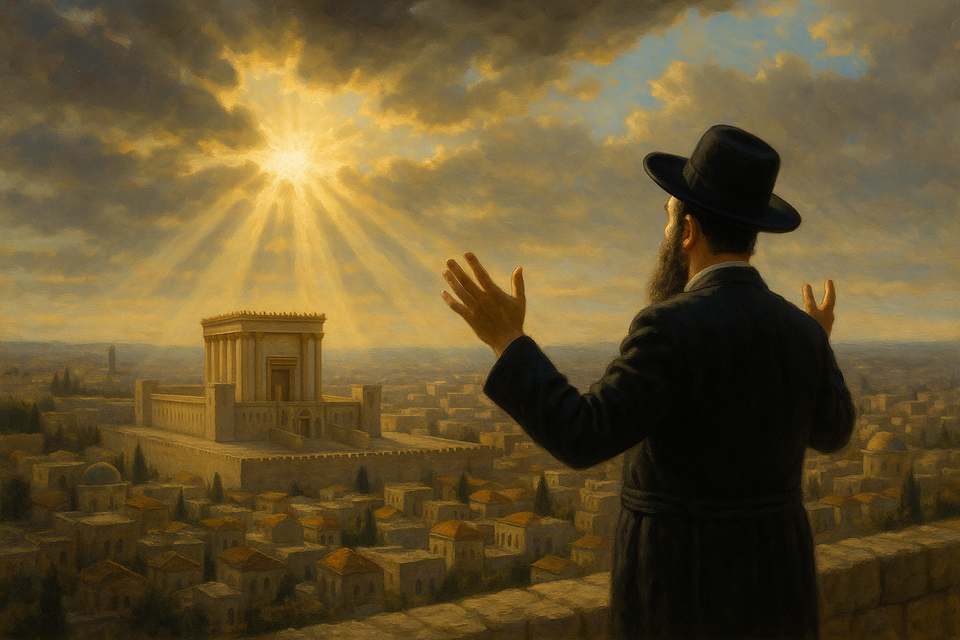Why Do the Gedolim Say That Relying on the State Delays the Coming of Moshiach?

To those unfamiliar with the Charedi worldview, the claim that relying on the State of Israel delays Moshiach’s arrival might sound startling. Isn’t a strong Jewish state a positive step forward? Doesn’t it help the Jewish people flourish? Doesn’t it protect Jews around the world?
But from a Torah lens—especially through the eyes of our Gedolim throughout the generations—the question is not whether the State helps, but whether it fulfills the spiritual conditions necessary to bring the true Geulah.
And the answer is: replacing our dependence on Hashem with reliance on human institutions, armies, or governments is a spiritual regression, not a progression.
1. The Core of Geulah: Returning to Hashem’s Kingship
The Rambam defines the Geulah clearly:
"המלך המשיח עתיד לעמוד ולהחזיר מלכות דוד ליושנה... ויבנה המקדש... ויקבץ נדחי ישראל."
“The King Moshiach is destined to arise and restore the kingdom of David to its former glory… rebuild the Beis HaMikdash… and gather the exiles.”
— Hilchos Melachim 11:1 [1]
This is not a political redemption. It is a spiritual one, marked by the return of Hashem’s revealed rule over the Jewish people, with Torah, mitzvos, and emunah at the center.
When Jews begin to believe that a secular government—a democracy built without Torah foundations—can replace the longed-for Geulah, it not only misdirects their faith, it dulls their yearning for what we are truly waiting for.
2. Hashem, Not Armies, Is Our Savior
Chazal were clear:
"אין ישראל נגאלין אלא בתשובה."
“Israel will not be redeemed except through teshuvah.”
— Rambam, Hilchos Teshuvah 7:5 [2]
Not through tanks. Not through elections. Not through diplomacy. The only “path” to Geulah is through a spiritual awakening and return to Hashem.
The more we rely on human strength, the more we push off that awakening.
The Chazon Ish zt”l once commented:
"לשים בטחונו בצבא או במדינה – זה מסיר את הלב מביטחון בהשם."
“Placing one’s trust in the army or the State removes the heart from bitachon in Hashem.” [3]
3. Rav Elchonon Wasserman zt”l: This Is Not Geulah—It Is Rebellion
Rav Elchonon, writing before the founding of the State but witnessing the rise of secular Zionism, was blunt:
"איך אפשר לומר על מדינה שמחללת שבת... שהיא אתחלתא דגאולה? זהו אתחלתא דשמד!"
“How can one say about a state that desecrates Shabbos... that it is the beginning of redemption? This is the beginning of apostasy!”
— Kovetz Maamarim, “Torah and Nationalism” [4]
He argued that calling the State “redemption” confuses Klal Yisrael and delays their return to the true path of Moshiach.
4. The Satmar Rebbe zt”l: The Illusion of Sovereignty
The Satmar Rebbe, Rav Yoel Teitelbaum zt”l, warned that clinging to the State as a redemptive entity leads to spiritual blindness:
"אם יסוד המדינה הוא נגד התורה – כל ההישענות עליה הוא הפך הגאולה."
“If the foundation of the State is against the Torah, then all reliance upon it is the opposite of redemption.”
— Vayoel Moshe, Maamar Shalosh Shevuos [5]
Instead of preparing for Moshiach, such dependence satisfies the Jew with a counterfeit version of Geulah.
5. Bitachon Means Waiting for Hashem to Save Us
The Gemara says:
"שלשה באים בהיסח הדעת: משיח, מציאה, ועקרב."
“Three things come when least expected: Moshiach, a lost item, and a scorpion.”
— Sanhedrin 97a [6]
This doesn’t mean Moshiach will surprise us because we weren’t looking. It means he comes only when we are not trying to force the Geulah on our terms.
If we put our hope in man-made solutions, we demonstrate we aren’t really waiting for Moshiach at all.
As Rav Aharon Kotler zt”l explained:
"הציפיה לגאולה דורשת חוסר הסתפקות בגלות, גם בגלות עם דגל כחול לבן."
“Yearning for redemption requires dissatisfaction with exile—even exile with a blue-and-white flag.” [7]
6. Every Moment of Delay Is Painful—For Us and for Hashem
Every day that Moshiach doesn’t come is another day of galus haShechinah, the exile of Hashem’s Presence. When we become comfortable—politically, financially, militarily—we lose that sense of pain.
The Midrash says:
"אין הקב"ה גואל את ישראל עד שיכירו בצרת גלותם."
“Hashem does not redeem Israel until they recognize the anguish of their exile.”
— Midrash Tanchuma, Nitzavim 1 [8]
The more we rely on the State, the less we feel the exile. And the less we feel the exile, the longer we stay in it.
Conclusion: Don’t Trade Eternity for Temporary Comfort
The Charedi world does not reject the physical benefits some Jews have experienced under the State—safe cities, Jewish schools, flourishing Torah. But we never confuse the means with the goal.
Moshiach will come when we all cry out together—not to the government, not to the IDF, not to the UN—but to Hashem, and only Hashem.
"ואין לנו על מי להישען אלא על אבינו שבשמים."
“We have none to rely upon but our Father in Heaven.” — Sotah 49b [9]
Until that happens, placing our faith elsewhere may feel safe—but it only delays the one thing we truly need: Geulah sheleimah.
Sources
- Rambam, Hilchos Melachim 11:1
- Rambam, Hilchos Teshuvah 7:5
- Pe’er Hador, vol. 4, on Chazon Ish’s views of bitachon
- Rav Elchonon Wasserman, Kovetz Maamarim, Maamar “Torah and Nationalism”
- Satmar Rebbe, Vayoel Moshe, Maamar Shalosh Shevuos
- Gemara Sanhedrin 97a
- Rav Aharon Kotler, quoted in Mishnas Aharon
- Midrash Tanchuma, Nitzavim §1
- Gemara Sotah 49b
